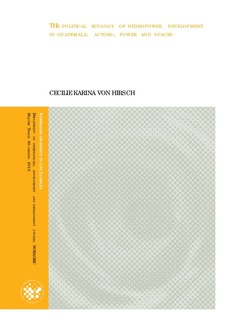| dc.contributor.author | Hirsch, Cecilie Karina von | |
| dc.date.accessioned | 2010-11-22T14:00:11Z | |
| dc.date.available | 2010-11-22T14:00:11Z | |
| dc.date.issued | 2010-11-22T14:00:11Z | |
| dc.identifier.uri | http://hdl.handle.net/11250/187721 | |
| dc.description.abstract | In this study I analyse the human and environmental interactions in the hydropower sector in Guatemala, with en emphasis on actors, spaces and power relations, using a political ecology framework. The local and civil society agency and participation in decision making about hydropower development has been explored through the various invited, claimed, and transformed spaces. Guatemala is a relevant case because of its potential for hydropower development; it is also a country with a high percentage of indigenous groups living in rural areas, dependent on access to the natural resources of their areas. Information has been gathered from various areas in the country using qualitative methods. Using narratives the arguments, interests, interplay and power relation of the multiple actors involved is explored. The narratives have been used to study conflicts about material resources and the ideas tied to these resources. I have presented various narratives about hydropower development; the dominant narrative presented by the companies and the state, the counter narrative presented by the communities, as well as an alternative narrative. The stories have involved conceptualization about development, the environment, and the role of the actors involved. The dominant narrative has proven to be an important justification for the current policies and practices in the sector and reflect the experiences and values of powerful groups in society’ and by implication those that they exclude. I link the more abstract discussion of power in political ecology with the actual practices of the actors in Guatemala. The study explores the negotiations and contestations between the various actors involved, and how these actors exercise power in different settings, the forms of power and how these again influences policy outcomes. This study shows how the communities and civil society actors employ various strategies to voice their interests, and opportunities have been created to exercise their agency and participate in certain spaces. The communities are taking action and making demands, challenging powerful interests. | en_US |
| dc.language.iso | eng | en_US |
| dc.subject | political ecology | en_US |
| dc.subject | hydropower | en_US |
| dc.subject | space | en_US |
| dc.subject | water power | en_US |
| dc.subject | participation | en_US |
| dc.subject | agency | en_US |
| dc.subject | Guatemala | en_US |
| dc.subject | indigenous peoples | en_US |
| dc.subject | environmental impact assessment | en_US |
| dc.subject | ecology | en_US |
| dc.title | The political ecology of hydropower development in Guatemala: Actors, power and spaces | en_US |
| dc.type | Master thesis | en_US |
| dc.subject.nsi | VDP::Social science: 200::Human geography: 290 | en_US |
| dc.subject.nsi | VDP::Social science: 200::Political science and organizational theory: 240::International politics: 243 | en_US |
| dc.subject.nsi | VDP::Social science: 200::Social anthropology: 250 | en_US |
| dc.subject.nsi | VDP::Social science: 200::Sociology: 220 | en_US |
| dc.source.pagenumber | 159 s. | en_US |
